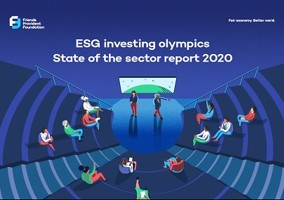The rise of environmental, social and governance (ESG) investing has been irresistible over recent years. However, more often than not the emphasis has been on the “E” and “G” rather than the “S”. This, says equities fund manager at EdenTree, Ketan Patel, is an oversight that he has always been working to rectify.
“The social element of ESG is coming to the forefront now because of the pandemic, but the truth is that the ‘S’ has been prominent since the early days of ethical funds in the 1920s. It has always been part of the core DNA of what we do,” says Patel. “However, the pandemic has highlighted massive levels of inequality and social injustice across society, whether they are based on gender, race or access to capital. There is little doubt the ‘S’ will continue to become more prevalent going forward as all aspects of our life, from how we work to how we socialise, have been impacted.”
Patel suggests that one of the reasons the social aspect has played a lesser role in ESG investment strategies up until now is that it is harder to measure.
“There’s still a lack of expertise in this area and the social aspect is often tacked on last minute when looking at long-term governance,” he says. “The problem is around how you measure social impact and attach a monetary value to that impact. Environmental initiatives are easy to measure and easy to monetise. If we put solar panels on our homes, for example, there’s a measurable return on that investment and there’s a payback period. Social impact is less straightforward. It is about telling the stories of how people’s lives have been changed.”
Convincing clients, however, has been helped by the fact that myths around social investments having lower returns have been debunked, says Patel. “Twenty years ago it was thought that you had to give up financial returns for your values, but in terms of capital preservation, income and total return, ethical funds perform extraordinarily well. It’s not binary anymore. It makes a much stronger case when you go to new or existing clients and show them how their money is making a real difference and where you can see social return, not just financial return.”
In light of recent circumstances, Patel thinks that charities now have an opportunity to embrace social impact in how they invest even more. “This is a watershed moment where charities can come to the fore and state that social justice is now going to be a core part of how they present themselves. And their fund manager has to be aligned to that.”
Aligning values and investments
Owned by a charitable trust, EdenTree has a deep understanding of this need to align investments with the values and missions of the organisations it supports. The key to maintaining this is due diligence and rigorous screening, says Patel.
“We have always looked at all three pillars of ESG. Capital has a role to play in holding management to account when it comes to all aspects of its operations including how it treats its employees and labour relations. We don’t just look at the company but at the whole supply chain,” he says.
Patel cites the example of Boohoo (never owned in EdenTree funds), which had an A+ ranking from some ESG rating agencies but then faced modern slavery investigations due to poor employee working conditions. Patel says that EdenTree has robust checks and balances that are designed to mitigate the chance of unintentionally investing in companies that operate bad practice and help avoid the associated reputational damage.
“We have an in-house team that constantly engages with the companies we invest in to avoid this type of risk for charities. It carries out independent research and publishes results for complete transparency. You have to remain vigilant because some companies start off well but then allow poor practices to seep in.”
Patel says that although some trustees may still argue that their fiduciary duty is to make the most money, over recent years charities are seeing that there is a risk in just chasing high returns. “Charities have to be cognisant that their reputation matters more than it did even a few years ago. They can’t just put their money in a tracker fund that makes lots of money but which invests unethically.”
He says this is partly driven by contemporary thinking in wider society. “This generation is probably the most aware of the damage that has been brought on the planet, not just environmentally, but also culturally and socially. People may stop giving if they think a charity is not doing the right thing with its finances or having a positive social impact.”
What we do
EdenTree are pioneers in responsible and sustainable investing, having launched one of the first ethical equity funds in the UK in March 1988.
We believe that the companies still making a return tomorrow will be the ones acting responsibly today. That’s why our approach to responsible and sustainable investing fully integrates environmental, social and corporate governance factors across every part of our investment process. EdenTree Investment Management Limited (EdenTree) Reg. No. 2519319.
EdenTree is authorised and regulated by the Financial Conduct Authority and is a member of the Investment Association.
Fast facts*
- 30-year track record
- £3bn of assets under management
*Figures as at 1 March 2021
Ketan Patel is equities fund manager at EdenTree Investment Management Ltd
Related articles











